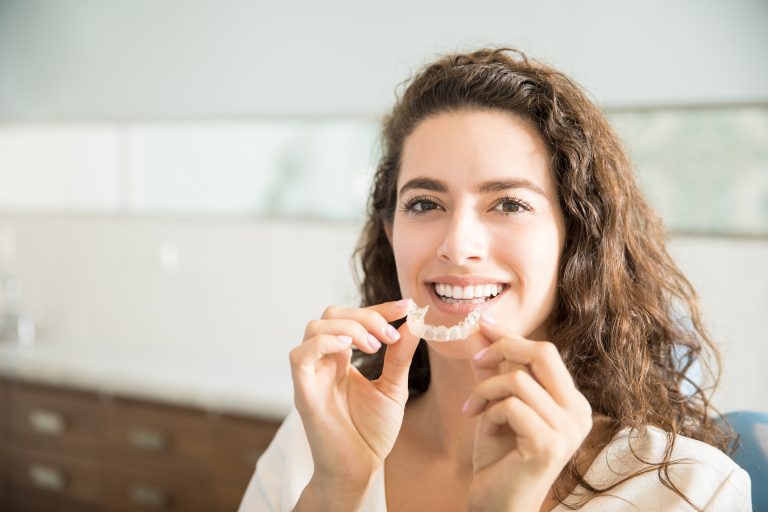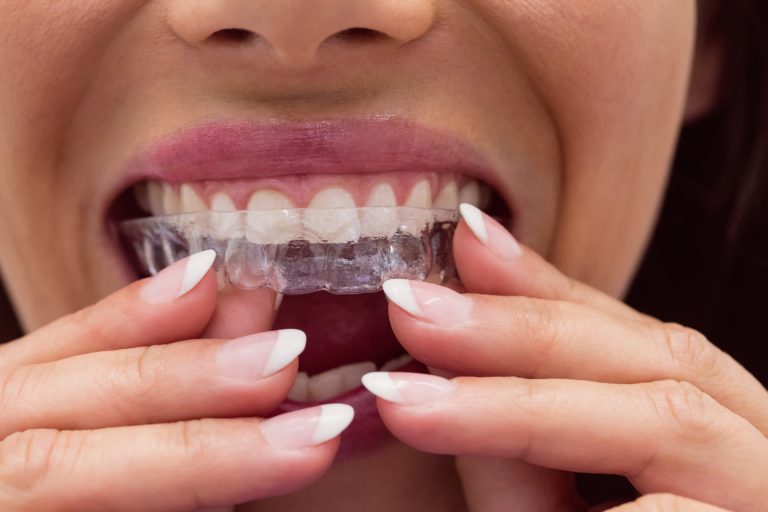


Gece diş plağı, diş hekimleri tarafından önerilen ve kullanılan bir cihazdır. Genellikle gece boyunca diş sıkma veya diş gıcırdatma (bruksizm) sorunlarını tedavi etmek veya hafifletmek için kullanılır. Bu durumlar sıklıkla uyku sırasında ortaya çıkar ve dişlerin aşınmasına, çene ekleminde ağrıya, baş ağrılarına ve diğer rahatsızlıklara yol açabilir.
Gece diş plağı, genellikle ağıza takılan ve dişlerin üstüne yerleştirilen bir cihazdır. Genellikle bir diş hekimi tarafından özel olarak kişinin diş yapısına uygun şekilde hazırlanır. Bu plağın amacı, dişleri korumak ve gece boyunca dişlerin sıkma veya gıcırdatma nedeniyle oluşabilecek zararları önlemektir.
Gece plakları diş hekimliğinde çok yönlü kullanımı ile dikkat çeker. Bu nedenle, “Gece plağı ne işe yarar?” sorusuna verilebilecek çok çeşitli yanıtlar vardır:
– Gece plakları yani oklüzal plaklar, çoğunlukla alt ve üst dişlerin doğru bir şekilde bir araya gelmediği maloklüzyonların düzeltilmesi amacıyla kullanılır. Söz konusu hizalanma hatası nedeniyle dişlerde düzensiz aşınma, çene ağrısı ve rahatsızlığı gibi çeşitli diş sorunlarına neden olabilir. Gece plakları, dişlerin temas etmemesi için stabil bir yüzey sağlar ve ısırığın yeniden hizalanmasına katkıda bulunur. Böylece alt ve üst diş kemerleri arasında daha uyumlu ve dengeli bir ilişki kurulması söz konusu olabilir.
– Diş gıcırdatma sorunu yaşayan kişiler, oklüzal plakların kullanımından optimum fayda sağlar. Gece plakları diş gıcırdatma dolayısıyla dişlerde aşırı aşınmayı önleyecek koruyucu bir bariyer olma görevini üstlenir. Yumuşatıcı bir etki oluşturur ve diş gıcırdatma etkisini azaltmayı sağlar. Bunun yanı sıra diş minesini koruyacak çene kaslarındaki gerilimin minimize edilmesini destekleyen bir unsur hâline gelir.
– Gece plakları, temporomandibular eklem bozukluklarının yönetilmesinde kritik bir rol üstlenir. Söz konusu bozukluklar çene ağrısı, sınırlı çene hareketi ve tıkırtı sesleri şeklinde ortaya çıkabilir. Oklüzal plaklar kuvvetlerin eşit bir şekilde dağılmasını kolaylaştırır. Temporomandibular eklem üzerindeki gerilimi hafifletir. Bu sayede temporomandibular eklem bozukluklarının tedavisine katkıda bulunur.
– Diş hekimleri özellikle oral sağlığı iyileştirme ve belirli diş sorunlarını ele alma amacıyla uygulanan kapsamlı tedavi planlarına oklüzal plakları da sıklıkla dahil eder. Bu planlarda genellikle ortodonti tedavi, restoratif prosedürler ve oklüzal ayarlamalar gibi müdahalelerin kombinasyonu yer alır. Bu kapsamda oklüzal plaklar, uygulanan tedavinin hedeflerine ulaşmasında kritik bir rol üstlenir.
Hasta Yorumları
Kliniğimizde, sıcak bir karşılama, şeffaf iletişim ve üstün hizmet kalitesiyle, diş sağlığı konusundaki tüm ihtiyaçlarınıza cevap vermeye hazırız.
Kaplamalarımla alakalı gitmiştim kaplamalarımın altında kistler oluşmuştu. İmplant takıldı şuan çok memnunum .Esra hanımdan önce 3 -4 tane dişçiye gittim ama hep problemler çıkardılar kaplamayı takarken dişlerimi kökten kırdılar. En son Esra hanımı önerdiler gittim ve çok memnun kaldım . Eli çok hafif ve işi bilen bir hekim Kanal tedavisi ile dişlerimin tamamını kurtardı. yakınlarıma,aileme tavsiye ettim . Ailemden de gidenler var.

zü...ç
TR
Esra hanıma komşumun tavsiyesi üzerine gittim iyi ki tavsiye etmiş iyi ki gitmişim çok memnunum implant yaptırdım tedavim hala da devam ediyor çok içten bir doktor hastasına güven veriyor ve çok rahatlatıyor ben de herkese tavsiye ederim

em...ş
TR
Sıkça Sorulan Sorular: “Gece Plağı“
Gece plağının günde en az 4 saat ayda ise en az 21 gün kullanılması uygun görülmektedir. Gece plağı, diş hekiminiz tarafından takip edilerek düzenli bakım ve kontrol ile uzun süre kullanılabilir.
Gece plağı diş sıkma şikayeti olan hastalardan dişlerinin ölçüsü alındıktan sonra, laboratuvar ortamında hazırlanan ve genellikle üst çeneye uygulanan şeffaf bir apareydir.
Hayır, gece plağı kullanmanın herhangi bir zararı bulunmamaktadır.
Ancak genel olarak 6 ay ile 3 yıl arasında kullanılabilmektedir. Bu süre üzerinde etkili olan faktörler aşağıdaki gibidir: Diş gıcırdatmanın şiddeti. Sahip olduğunuz gece plağının kalitesi ve türü
